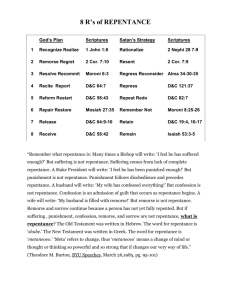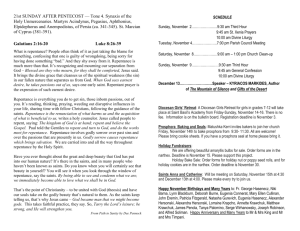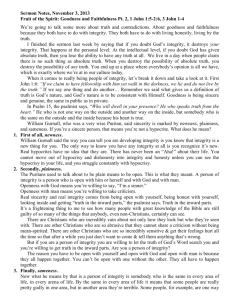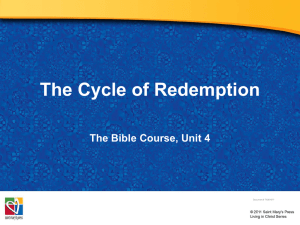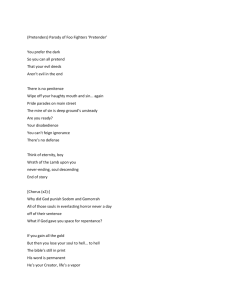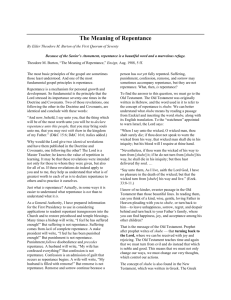the restored doctrine of repentance
advertisement
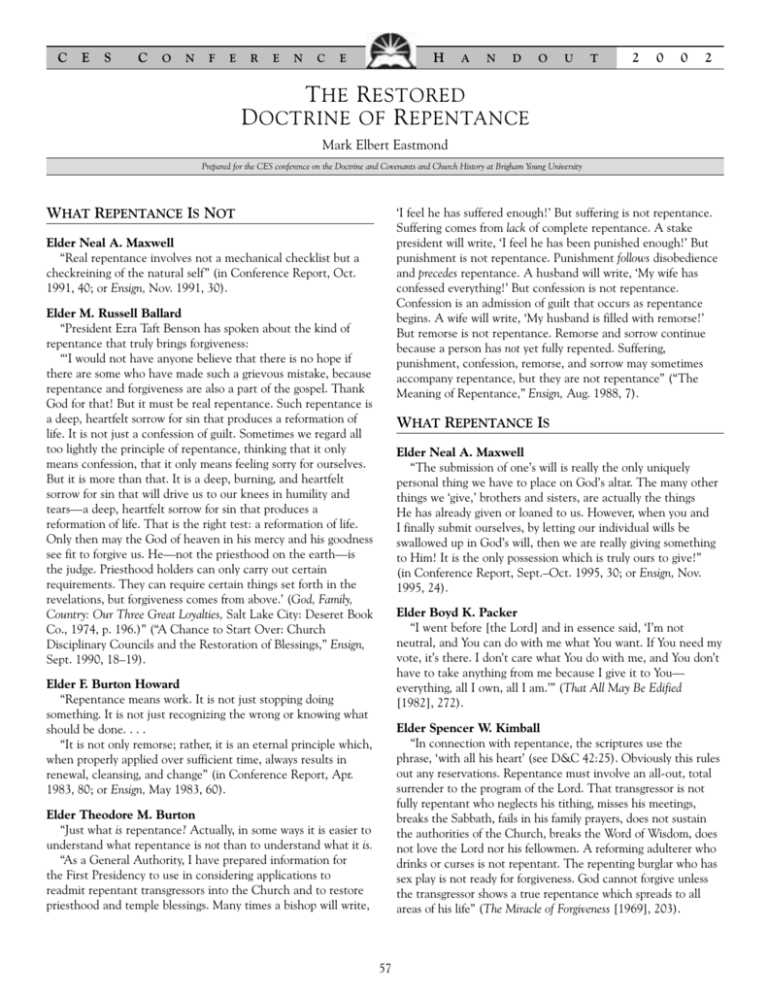
C E S C O N F E R E N C H E A N D O U T 2 0 0 2 T HE R ESTORED D OCTRINE OF R EPENTANCE Mark Elbert Eastmond Prepared for the CES conference on the Doctrine and Covenants and Church History at Brigham Young University WHAT REPENTANCE IS NOT ‘I feel he has suffered enough!’ But suffering is not repentance. Suffering comes from lack of complete repentance. A stake president will write, ‘I feel he has been punished enough!’ But punishment is not repentance. Punishment follows disobedience and precedes repentance. A husband will write, ‘My wife has confessed everything!’ But confession is not repentance. Confession is an admission of guilt that occurs as repentance begins. A wife will write, ‘My husband is filled with remorse!’ But remorse is not repentance. Remorse and sorrow continue because a person has not yet fully repented. Suffering, punishment, confession, remorse, and sorrow may sometimes accompany repentance, but they are not repentance” (“The Meaning of Repentance,” Ensign, Aug. 1988, 7). Elder Neal A. Maxwell “Real repentance involves not a mechanical checklist but a checkreining of the natural self” (in Conference Report, Oct. 1991, 40; or Ensign, Nov. 1991, 30). Elder M. Russell Ballard “President Ezra Taft Benson has spoken about the kind of repentance that truly brings forgiveness: “‘I would not have anyone believe that there is no hope if there are some who have made such a grievous mistake, because repentance and forgiveness are also a part of the gospel. Thank God for that! But it must be real repentance. Such repentance is a deep, heartfelt sorrow for sin that produces a reformation of life. It is not just a confession of guilt. Sometimes we regard all too lightly the principle of repentance, thinking that it only means confession, that it only means feeling sorry for ourselves. But it is more than that. It is a deep, burning, and heartfelt sorrow for sin that will drive us to our knees in humility and tears—a deep, heartfelt sorrow for sin that produces a reformation of life. That is the right test: a reformation of life. Only then may the God of heaven in his mercy and his goodness see fit to forgive us. He—not the priesthood on the earth—is the judge. Priesthood holders can only carry out certain requirements. They can require certain things set forth in the revelations, but forgiveness comes from above.’ (God, Family, Country: Our Three Great Loyalties, Salt Lake City: Deseret Book Co., 1974, p. 196.)” (“A Chance to Start Over: Church Disciplinary Councils and the Restoration of Blessings,” Ensign, Sept. 1990, 18–19). WHAT REPENTANCE IS Elder Neal A. Maxwell “The submission of one’s will is really the only uniquely personal thing we have to place on God’s altar. The many other things we ‘give,’ brothers and sisters, are actually the things He has already given or loaned to us. However, when you and I finally submit ourselves, by letting our individual wills be swallowed up in God’s will, then we are really giving something to Him! It is the only possession which is truly ours to give!” (in Conference Report, Sept.–Oct. 1995, 30; or Ensign, Nov. 1995, 24). Elder Boyd K. Packer “I went before [the Lord] and in essence said, ‘I’m not neutral, and You can do with me what You want. If You need my vote, it’s there. I don’t care what You do with me, and You don’t have to take anything from me because I give it to You— everything, all I own, all I am.’” (That All May Be Edified [1982], 272). Elder F. Burton Howard “Repentance means work. It is not just stopping doing something. It is not just recognizing the wrong or knowing what should be done. . . . “It is not only remorse; rather, it is an eternal principle which, when properly applied over sufficient time, always results in renewal, cleansing, and change” (in Conference Report, Apr. 1983, 80; or Ensign, May 1983, 60). Elder Spencer W. Kimball “In connection with repentance, the scriptures use the phrase, ‘with all his heart’ (see D&C 42:25). Obviously this rules out any reservations. Repentance must involve an all-out, total surrender to the program of the Lord. That transgressor is not fully repentant who neglects his tithing, misses his meetings, breaks the Sabbath, fails in his family prayers, does not sustain the authorities of the Church, breaks the Word of Wisdom, does not love the Lord nor his fellowmen. A reforming adulterer who drinks or curses is not repentant. The repenting burglar who has sex play is not ready for forgiveness. God cannot forgive unless the transgressor shows a true repentance which spreads to all areas of his life” (The Miracle of Forgiveness [1969], 203). Elder Theodore M. Burton “Just what is repentance? Actually, in some ways it is easier to understand what repentance is not than to understand what it is. “As a General Authority, I have prepared information for the First Presidency to use in considering applications to readmit repentant transgressors into the Church and to restore priesthood and temple blessings. Many times a bishop will write, 57 “. . . It is one of those ironies of godhood that in order to find peace, the offended as well as the offender must engage in the principle of forgiveness” (in Conference Report, Oct. 1996, 114; or Ensign, Nov. 1996, 83). C. S. Lewis “Christ says ‘Give me All. I don’t want so much of your time and so much of your money and so much of your work: I want You. I have not come to torment your natural self, but to kill it. No half-measures are any good. I don’t want to cut off a branch here and a branch there, I want to have the whole tree down. I don’t want to drill the tooth, or crown it, or stop it, but to have it out. Hand over the whole natural self, all the desires which you think innocent as well as the ones you think wicked—the whole outfit. I will give you a new self instead. In fact, I will give you Myself: my own will shall become yours.’” (Mere Christianity [1960], 169). THE RESULT OF TRUE REPENTANCE President Ezra Taft Benson “We must be careful, as we seek to become more and more godlike, that we do not become discouraged and lose hope. Becoming Christlike is a lifetime pursuit and very often involves growth and change that is slow, almost imperceptible. The scriptures record remarkable accounts of men whose lives changed dramatically, in an instant, as it were: Alma the Younger, Paul on the Road to Damascus, Enos praying far into the night, King Lamoni. Such astonishing examples of the power to change even those steeped in sin give confidence that the Atonement can reach even those deepest in despair. “But we must be cautious as we discuss these remarkable examples. Though they are real and powerful, they are the exception more than the rule. For every Paul, for every Enos, and for every King Lamoni, there are hundreds and thousands of people who find the process of repentance much more subtle, much more imperceptible. Day by day they move closer to the Lord, little realizing they are building a godlike life. They live quiet lives of goodness, service, and commitment. They are like the Lamanites, who the Lord said ‘were baptized with fire and with the Holy Ghost, and they knew it not.’ (3 Ne. 9:20; italics added.)” (“A Mighty Change of Heart,” Ensign, Oct. 1989, 5). THE ROLE OF CONFESSION Elder Richard G. Scott “You always need to confess your sins to the Lord. If they are serious transgressions, such as [sexual] immorality, they need to be confessed to a bishop or stake president. Please understand that confession is not repentance. It is an essential step but is not of itself adequate. Partial confession by mentioning lesser mistakes will not help you resolve a more serious, undisclosed transgression. Essential to forgiveness is a willingness to fully disclose to the Lord and, where necessary, His priesthood judge, all that you have done” (in Conference Report, Apr. 1995, 102; or Ensign, May 1995, 76). THE REQUIREMENT OF FORGIVING OTHERS Elder Jeffrey R. Holland “We are to forgive even as we are forgiven. In this we participate in the very essence of the Atonement of Jesus Christ. . . . 58
